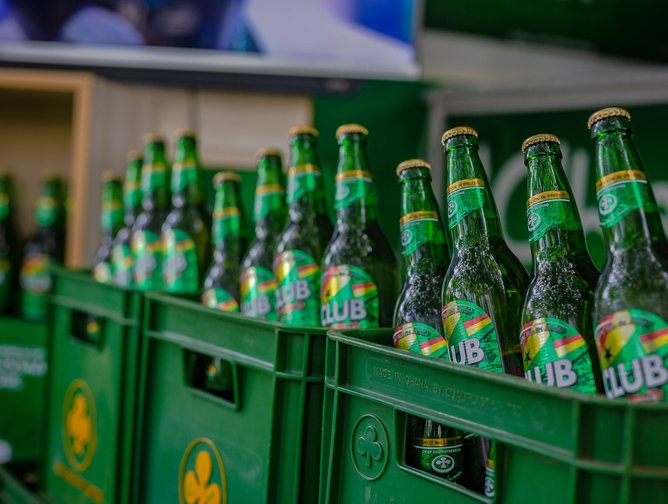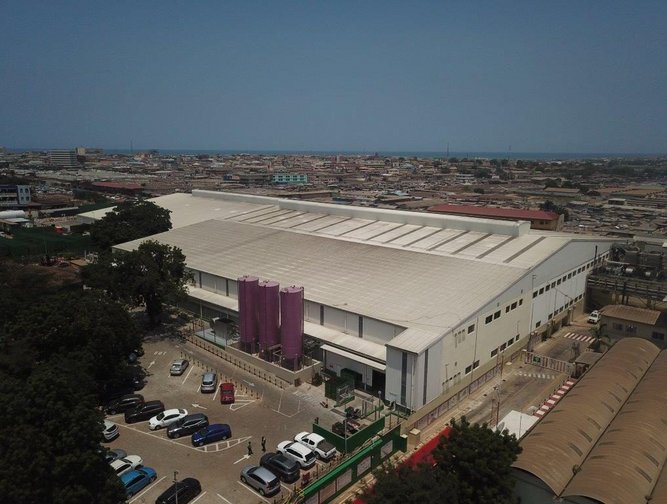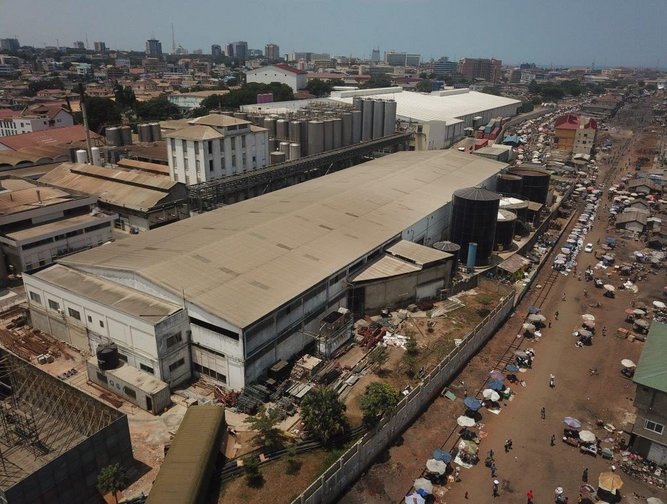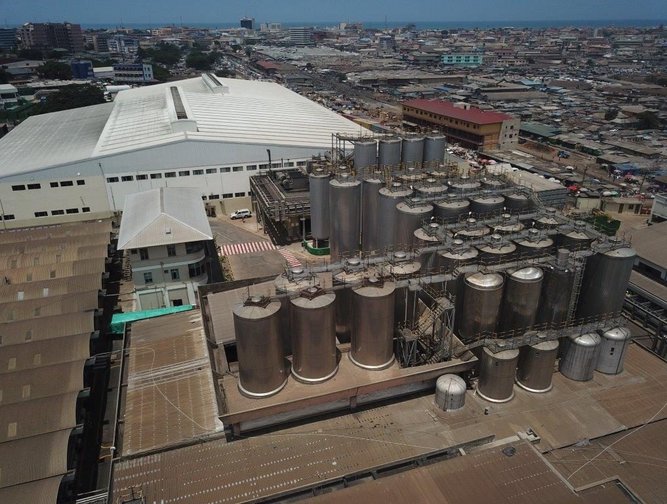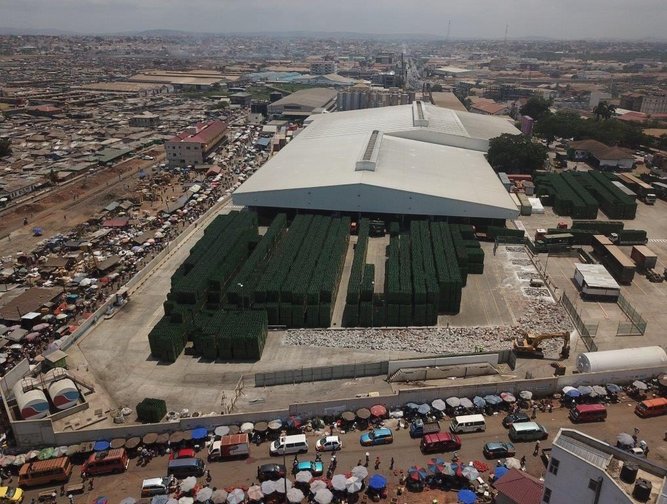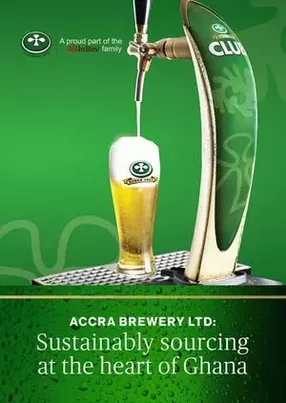How Accra Brewery Limited delivers the sustainable vision of AB InBev to the heart of Ghana
As a company that is proudly part of the AB InBev family, the world’s largest brewer, there is a responsibility to deliver the company’s ambitious 2025 global sustainability goals of creating a better world right down to a local level.
Accra Brewery Limited (ABL), the oldest brewery in Ghana, is dedicated to celebrating national pride and bringing people together for a better world through West Africa: a business model and vision that aligns perfectly with that of its parent company.
The company has its own sustainably goals that are aligned and complement those of AB InBev and the 2025 Sustainability Goals. These include:
Smart Agriculture: 100% of our direct farmers will be skilled, connected and financially-empowered.
Climate Action: 100% of our purchased electricity will be from renewable sources; and a 25% reduction in CO2 emissions across our value chain (science-based).
Entrepreneurship: Retailer Development Programme (RDP), aimed at equipping small retailers with relevant business skills to enable them increase their sales and revenues.
Key to achieving these goals is Accra Brewery’s procurement function , which is spearheaded by Wil Fameni, Head of Procurement & Sustainability. As a result of his experience from working at AB InBev Global Headquarters in Leuven, Belgium as the Global Category Manager, Mr Fameni has a key understanding of implementing global strategies at a local level.
Mr Fameni mentioned that during his work experience in Leuven, he played a key role in establishing the global strategy in the real estate and fleet categories of the company. “I was personally involved in understanding how to create and implement those strategies in terms of rationalisation of brand andoperating models with regards to procurement and sustainability.”
Mr Fameni would then liaise directly with each zones’ managers to oversee the launch and implementation of these operating models
In his current role, he is now at the other end of the spectrum and is directly involved the implementation process. He feels that his experience globally has provided him with the ideal insight into understanding the various tasks.
“I understand how the company works and how and where it wants to go globally,” he says. “I can really leverage my understanding of the decision-making here in Ghana to ensure that we are capable of embracing these global strategies and balance them with the inner dynamics of Ghana and West Africa.”
Mr Fameni is currently handling an Agricultural Study Request For Proposal to review the maize, cassava and sorghum supply chains in Ghana. This is to better understand the entry points for an agriculture development program, and the challenges and opportunities that should be addressed to optimize these value chains.
This research is crucial in order for ABL to deliver on its promise to empower farmers who will positively impact Ghana’s agricultural development. With an expected completion date of the study in late 2018, Fameni will be able to explore avenues in which Accra Brewery Limited can improve market inefficiencies and close these gaps.
“I know there is some work to be done, particularly in the area of educating farmers on how to improve their yield. What I have observed is that the farmers have limited knowledge in the type of seeds which are used for farming, the type of equipment needed to increase yield using various channels of farming to improve their yield. If we can improve the yield, then we can gain a better understanding of their abilities and a better understanding of cost.”
As the oldest brewery in Ghana operating under the global umbrella of one of the largest multi-national companies in the world, Accra Brewery Limited is heavily engrained in the Ghanaian culture. Mr Fameni states that our sustainability goals clearly depict a company focused on investing in the country and creating a better world for Ghanaians.
“Accra Brewery Limited is in existence and a recognized company of national pride which creates extraordinary moments by brewing and sharing only the finest beverages. In addition, our goal is to give back in a meaningful and sustainable way.”
This relationship and active presence within the Ghanaian community (visits to farmers and plantations in Kintampo and Sunyani regions) is what Fameni considers to be a significant success during his experience with Accra Brewery.
Fameni’s key question is “How does the company continuously assess that it is delivering on its promises”?
In order to answer this question, Mr Fameni will use the market study he is conducting.
As a business, he recognises that there will be Key Performance Indicators (KPIs) on cost savings and profit margins. However, one of the simplest ways of measuring success is determining where Accra is sourcing its raw materials.
See also:
- Bolloré Logistics continues to drive its sustainability agenda on a global scale
- Flogas has embraced digitisation in order to skill up its workforce and transform its supply chain
- Transportadora de Gas del Norte: Tradition and Innovation in The Argentinian Natural Gas Industry
“In my opinion, the first and easiest way to measure is to look at the percentage in which we are buying directly from farmers, aggregators, and industrial millers and processors versus imports.” “Of course, that’s not the only way we can measure, but it’s a core component of our goal of starting small and setting bigger targets and challenges.”
In procurement, a company is only as good as its supplier network and so it is very important that a business invests in and develops not only a strong and robust network, but a network made up of the “right” partners and suppliers.
Identifying the right partner is a challenge that Mr Fameni recognises and much like the company’s approach to the customers and to the market, he goes above and beyond to understand what makes a supplier react positively or negatively.
“The right partner to me is a partner that understands our vision,” he says. “So, when I go out and meet our existing and potential future suppliers, I take great strides to understand their business, where they are heading and what they are doing to align to and add value to our own growth, and sustainability goals.”
As the company looks to the future, it does so with ambitions beyond Ghana. Mr Fameni will look to establish a best practice agenda in which he can then replicate the successes and achievements from Ghana into other African countries.
Currently the company’s immediate near-term goal is to increase the use of renewable electricity by implementing solar panels at its brewery. This will result in 20% of the company’s electricity usage sourced purely by solar energy. This will be a first step towards our target of 100% by 2025.
Ultimately, this is a learning curve for Accra Brewery and for Ghana.
“We are trying to push new boundaries and discover how we can do more,” says Mr Fameni. “We are learning as much as we can from the retailers, to the farmers and everyone in between in terms of how we can deliver growth through sustainable initiatives.”
“This is a continuously evolving journey, but the ultimate goal is to create long-term value for our business, partners and communities in Ghana. That’s the vision.”
